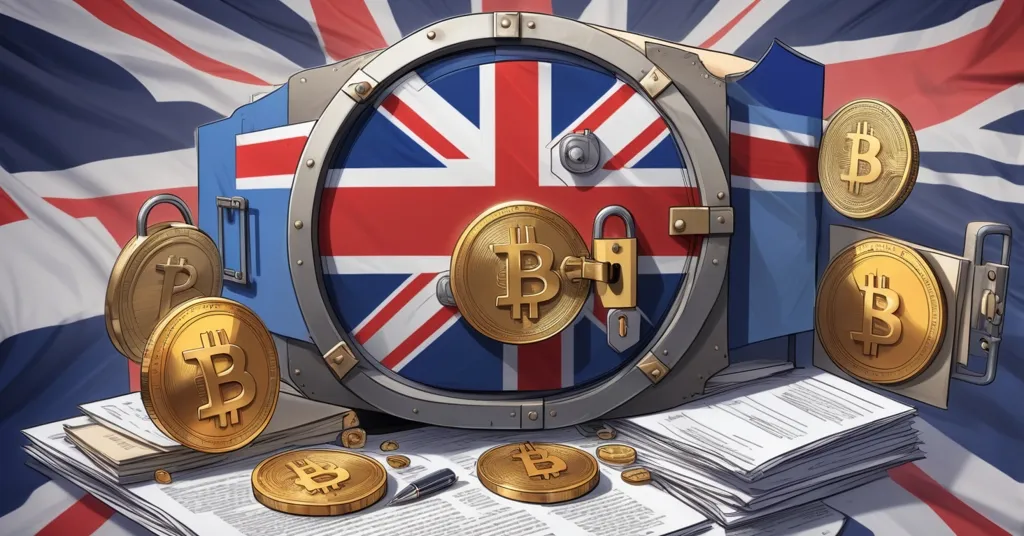UK Freezes £6 Million in Crypto: New Powers Target Money Laundering and Privacy

UK Authorities Freeze £6 Million in Crypto: A Closer Look at New Enforcement Powers
Since April 2024, the UK has frozen over £6 million in cryptocurrency, utilizing new enforcement powers aimed at curbing money laundering, tax evasion, and terrorism financing. This crackdown marks a significant step in the government’s strategy to regulate the crypto space, but it also raises questions about privacy and the future of digital currencies.
- £6 million in crypto frozen since April 2024
- New powers allow freezing of suspicious wallets for up to three years
- Largest single order: £1.5 million on Coinbase
- Crime and Policing Bill to enhance enforcement
Since April 2024, UK authorities have been granted the power to freeze suspicious cryptocurrency wallets for up to three years. This move is a direct response to the growing use of digital currencies in illegal activities. The largest single freezing order, amounting to £1.5 million, was issued by HMRC (Her Majesty’s Revenue and Customs, the UK’s tax authority) against a wallet on Coinbase, a popular cryptocurrency exchange. This action showcases the government’s willingness to target major players in the crypto ecosystem.
Court data from the past six months suggests that the total amount of frozen cryptocurrency might even be higher than reported, due to legal restrictions on disclosing such information. This crackdown is part of a broader global trend where governments are tightening their grip on cryptocurrencies to prevent their misuse.
Legal experts have mixed views on the significance of these seizures. Nick Barnard, a cryptocurrency legal specialist, described the £6 million figure as “relatively modest in the grand scheme,” suggesting that the enforcement regime needs time to develop. On the other hand, lawyer Siobhain Egan noted, “The government is directing increased resources toward freezing cryptocurrency assets. This is part of an aggressive strategy to combat money laundering and terrorism financing.” She further explained, “If police have a major investigation into organized criminals laundering money through crypto, they will go in and seize the assets before they finalize the investigation.”
“The £6 million figure is relatively modest in the grand scheme.” – Nick Barnard, Cryptocurrency Legal Specialist
“The government is directing increased resources toward freezing cryptocurrency assets. This is part of an aggressive strategy to combat money laundering and terrorism financing.” – Siobhain Egan, Lawyer
The freezing process itself is quite stealthy, allowing investigators to apply for orders without notifying the alleged criminals, effectively plugging gaps in the investigative process. However, challenges remain, particularly with freezing assets held by foreign nationals and those stored in private wallets, which are beyond the reach of current enforcement capabilities. Private wallets, which are not connected to centralized exchanges, pose a significant challenge for authorities attempting to freeze assets.
In addition to these new powers, the UK government is pushing forward with the Crime and Policing Bill, aimed at further enhancing cryptocurrency enforcement. This legislation includes provisions for valuing cryptocurrency, implementing procedures for courts to recover illicit funds, and granting the Crown Court (a higher court in the UK) expanded powers to issue seizure orders. The bill reflects the government’s commitment to not only freeze but also recover and potentially destroy seized crypto assets if deemed not conducive to the public good, especially privacy coins used by criminals to obfuscate funds.
The UK’s efforts to regulate the crypto space are commendable, yet they highlight the ongoing tension between privacy, freedom, and the need for security. As a champion of decentralization and effective accelerationism, it’s crucial to recognize that while these measures aim to curb illegal activities, they also pose risks to the very principles that underpin the crypto revolution. The balance between regulation and innovation remains a delicate dance, one that requires constant vigilance and critical thinking from all stakeholders in the crypto community.
From a Bitcoin maximalist perspective, these regulations might impact Bitcoin differently than other cryptocurrencies. Bitcoin, with its robust network and widespread adoption, could potentially be seen as a safe haven compared to other digital currencies. However, these regulations could also impact the overall crypto market, affecting investor confidence and the adoption of new technologies.
Internationally, the UK’s approach is part of a broader trend. Countries like the United States and Japan have also implemented strict regulatory measures to combat crypto-related crimes. The effectiveness of these measures varies, but they all aim to strike a balance between fostering innovation and preventing misuse.
Key Takeaways and Questions
- What is the total amount of cryptocurrency frozen by UK authorities since April 2024?
Approximately £6 million ($7.7 million) has been frozen.
- What are the new enforcement powers introduced in the UK in April 2024?
These powers allow police, law enforcement agencies, and HMRC to freeze suspicious cryptocurrency wallets for up to three years.
- What was the largest single freezing order issued by UK authorities?
The largest single freezing order was for £1.5 million, issued by HMRC against a wallet on Coinbase.
- What are the main purposes of the new enforcement powers?
The main purposes are to combat money laundering, tax evasion, and terrorism financing.
- How do legal experts view the significance of the £6 million in frozen cryptocurrency?
Nick Barnard considers it modest, suggesting the enforcement regime needs time to develop, while Siobhain Egan notes an aggressive governmental strategy to combat illegal activities.
- What is the Crime and Policing Bill and its relevance to cryptocurrency enforcement?
The Crime and Policing Bill is UK legislation aimed at enhancing cryptocurrency enforcement by including provisions for valuing cryptocurrency, implementing procedures for courts to recover illicit funds, and granting the Crown Court expanded powers to issue seizure orders.
